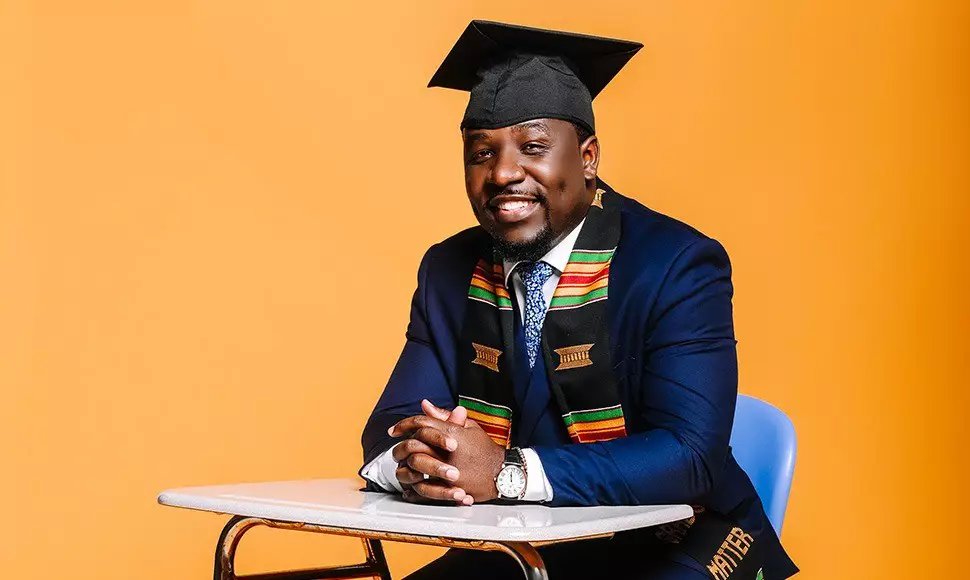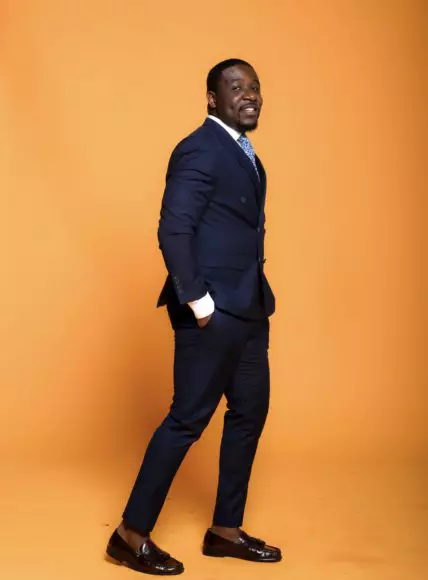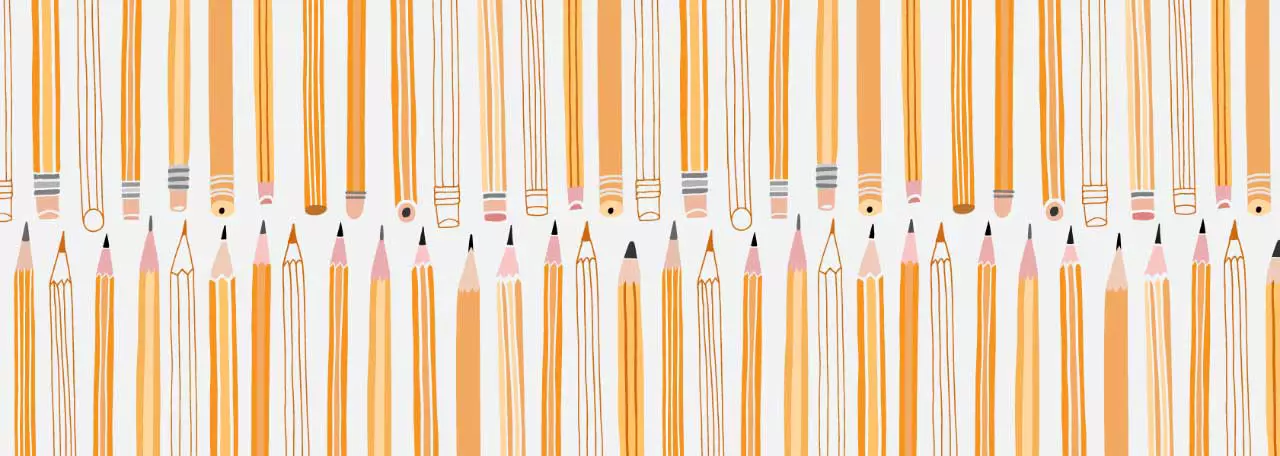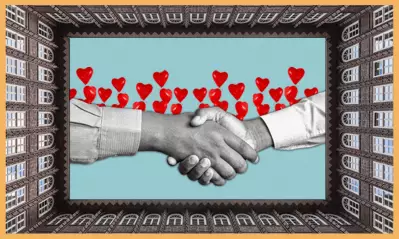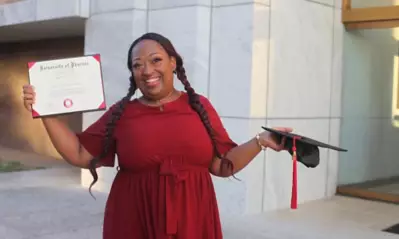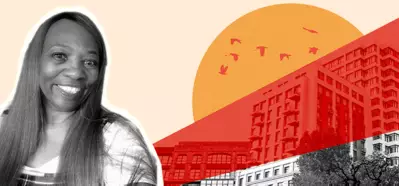Discover more stories in our Alumni Chronicles Magazine!
Rising up and giving back: Jahmar Robinson didn’t let a difficult childhood stop him from helping his community
By Lilia Ortiz
"It makes no sense to graduate from high school based on the statistics of your neighborhood."
Those were the words a guidance counselor once said to a 15-year-old Jahmar Robinson.
Coming from a poverty-stricken home with parents who emigrated from Jamaica to the U.S., Robinson’s upbringing wasn’t easy. He and his family lived in a neighborhood known as the "Deepside" in Sunrise, Florida, marked by violence and gang activity; Robinson survived numerous evictions, homelessness and abuse as he grew up.
According to Robinson, now 28, it was hard to imagine graduating from high school, never mind college. But instead of letting that guidance counselor’s comment stop him, he used it as motivation to graduate high school and give back to his community.
After high school, he pursued a two-year degree in the community worker program at George Brown College in Toronto. Upon returning to Florida, Robinson became a social worker and community advocate, working with organizations to help members of his community through subsidy programs and assessing at-risk children. He later became an executive project coordinator and assisted with program initiatives.
From his upbringing, Robinson knew how important resources like these could be. His work in social services helped him recognize how much he enjoyed helping members of his community. To continue to serve, he decided to pursue a Bachelor of Science in Correctional Program Support Services at University of Phoenix in 2018 and transitioned into a career as a police officer in early 2020.
Later that year, he enrolled in a paramilitary police academy while continuing his studies at University of Phoenix. While attending the academy, Robinson and his wife became sick with COVID-19. Yet even that didn’t break his commitment to making a difference in his community. He would work at the police academy in the daytime and then came home at night to take on his "other three jobs" as a father, husband and University of Phoenix student.
Of this experience, he says, "The compassion to serve was innate for me, and I realized then that I was … destined to take my passion and skill set to the next level. I was excited to venture into this new career and … continue to be an example to my community and peers."
He would go on to graduate from the police academy in March 2021, receiving the top Defensive Tactics award and the Leadership and Peer Excellence award, and earn his degree in April 2021. Robinson credits his empathy and experiences for making him a better police officer, which, he says, "requires one to be committed to the people and [holding up] the rights of the people in our government and our Constitution."
We asked Robinson why he decided to pursue a career in public service, how he’s remained committed to his community through his work as a police officer and other steps he’s taken to make a difference in people’s lives.
What led you to pursue a Bachelor of Science in Correctional Program Support Services?
In my community growing up, it was common to see the effects of incarceration on individuals who were later integrated into society as ex-offenders. As a result, I saw the outcome of the rehabilitation efforts of our corrections and criminal justice system and how negatively it affected my local community.
Additionally, while working as a social worker with individuals directly affected by incarceration in some way—either through a relative, spouse or child—I became aware of the obstacles they faced, including homelessness, financial instability or joblessness, due to a lack of education and no access to child care and mental health resources.
I felt confident that a Bachelor of Science in Correctional Program Support Services at University of Phoenix would allow me a way to be part of a solution and reform. The University helped me become well equipped and ready to engage with other visionaries to continue the reform and building of our correctional and criminal justice system.
How did your experience as a social worker help you connect with your community?
In most communities, social workers are generally the front-liners to resources for individuals who may be less fortunate. As a social worker, I enjoyed connecting with diverse people with different needs, backgrounds, traditions and beliefs.
Being a social worker made me more open-minded and empathetic to the circumstances of others. It also allowed me to have a deeper understanding of people’s needs. More importantly, my experience in the role prepared me to be an effective police officer. In other words, my role as a police officer isn’t just to enforce the laws but to be an effective member and participant of my community.
You mention you’re passionate about helping others become their best selves. Can you think of a moment when you’ve been able to do that for someone?
Every person can do something I call "being your best self," which implies that a person has built up enough self-confidence to overcome obstacles and circumstances that may cause a setback. While working as a social worker, I came across many individuals who had difficult life setbacks. I would always do my best to empower and uplift them, helping them identify other alternatives to be successful in their own way.
For example, there was a young mother of four who desperately needed child care services. She was out of options, but I remember telling her that I would do everything in my power to ensure that she received the help she needed. Eventually, with much help from community providers and the agency’s assistance, I obtained full-time child care services for her, which allowed her to keep her job and go back to school to earn her GED and later pursue her nursing degree.
I remember encouraging her by saying, "Your circumstance should never hold you back from your dreams of wanting to be successful and, more importantly, becoming your best self." I explained to her that she could do anything through determination.
Some people just need a little push or a reminder that they can do it. All it takes is a little kindness. Showing that you care can go a long way to empower many.
How would you say your work as a police officer has helped you remain committed to your community, particularly during such challenging times?
Police work is always and will always be challenging, and I knew this when I started the job. It is a demanding career that requires you to be authoritative, helpful, thoughtful, empathetic and attentive and maintain situational awareness all at the same time.
During these trying times, I remember my personal commitments, which began in my community amongst the people. That very thought alone keeps me humble and grounded. Furthermore, my past experiences as a social worker have been highlighted even more as a police officer. I am still committed, still ambitious towards serving the people and will always be no matter how far I go in my career.
What’s a commitment in your life that you don’t regret breaking?
I was once committed to what people thought about who I was and who they thought I would become. At one point in time, I actually believed the statistics of the neighborhood I grew up in. I displayed this commitment by embracing the cultural norms of my surroundings. It was a devastating mindset to have. However, I decided one day that I would no longer be committed to the norm of what society thought of my community or me.
I decided to break the commitment of being afraid to go as far as my mind and heart tell me to go, and I will never regret that. I will never regret choosing to be confident and unforgivingly ambitious towards my goals. More importantly, by breaking the commitment to that way of thinking, I have been able to inspire others to do the same and join me in a journey to success and becoming our best selves.
As my favorite quote goes by Reuel Buchanan: "Aspire to inspire before you expire."
Our "Committed" series interviews extraordinary individuals, like Jahmar Robinson, who have broken through barriers to create successful habits that signal trust in themselves and the people around them.
If you’re ready to enhance your career, find out how University of Phoenix can help.
Have a story about how you dug deep within yourself to create a career and life you love? We want to hear from you. Email content@phoenix.edu to share your story.
